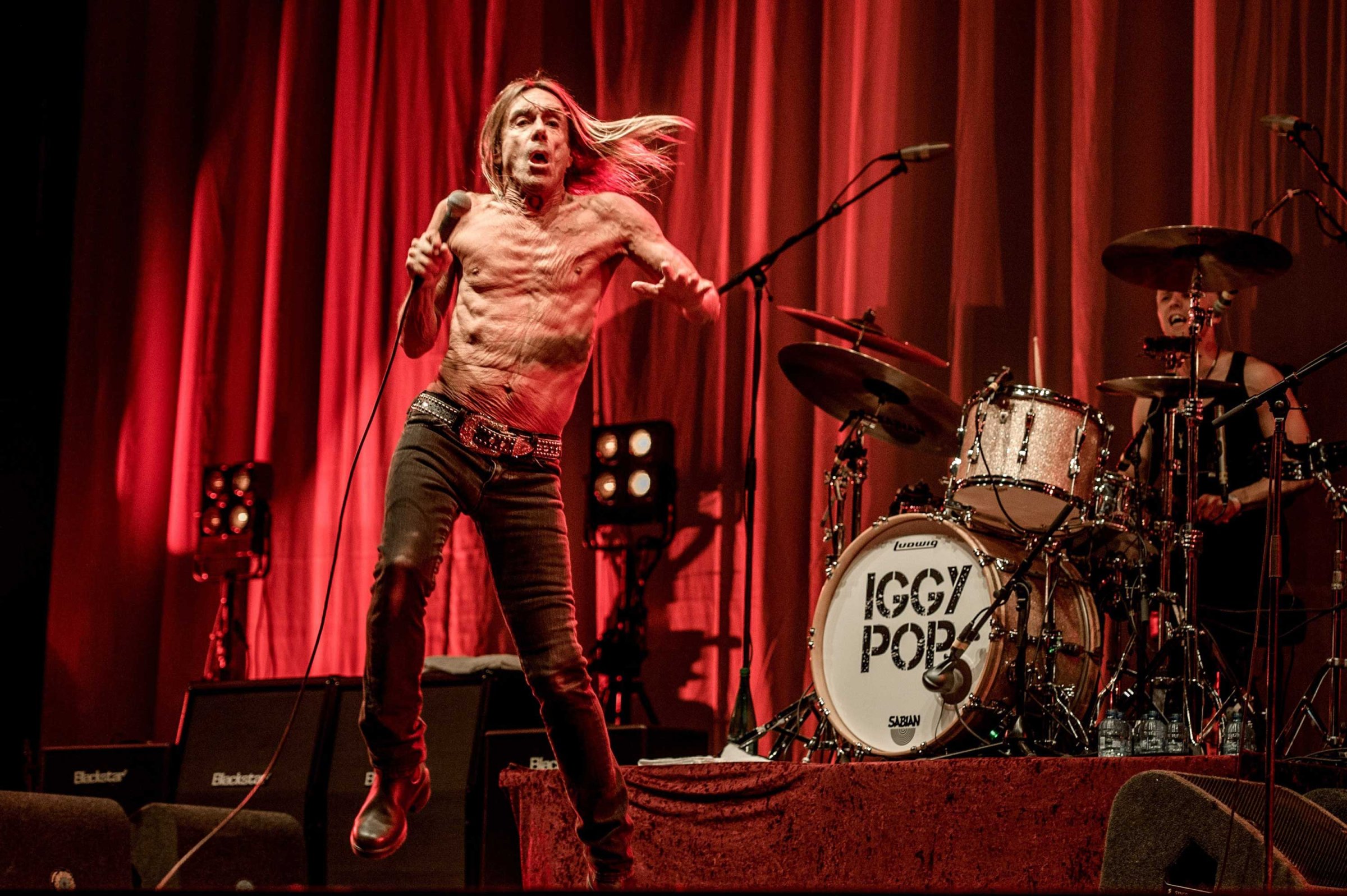
It’s not even five minutes into a phone conversation with Iggy Pop before he mentions that he’s conducting the interview stark naked. “A person wants to be comfortable, and that’s one way I get comfortable,” he says. At the same time, Pop makes sure to point out that he’s speaking from the backyard of his Miami home, which is “walled and forested.” And his revelation doesn’t come without context: he’s answering a question about his predilection for performing shirtless. Still, the utter lack of self-consciousness–or lasciviousness–with which Pop reveals his full monty of information speaks to a legendary rock-‘n’-roll character like no other.
For nearly 50 years, as a member of the Stooges and as a solo artist, Pop has been a performer completely in touch with his feral self. In proto-punk anthems like “Search and Destroy” and “I Wanna Be Your Dog,” as well as in unbound stage shows that have incorporated household appliances, hamburger meat and blood, Pop has served as a musical incarnation of the id, as feeling made flesh.
At 68, however, the star admits to “having a few nicks” in his body, and tellingly, he has chosen this moment to release an album that puts him in the past tense: Post Pop Depression. It’s a work filled with lyrics that address his legacy with existential fret. Small wonder, when characterizing the sustainability of his no-holds-barred career, that Pop sounds like a wizened warrior when he says, “I’m contemplating a phased withdrawal with honor.”
The music on Post Pop gives fans plenty to honor as well as notions to ponder. It’s one of the most vital and engaged works of his career. It also finds him in fresh company, collaborating with Josh Homme, leader of one of the few rock bands to still chart high, Queens of the Stone Age. Their collaboration arrives at a strangely aligned time, directly after the death of a man who Pop recently said “resurrected” his career: David Bowie. “David guided me and put me in a place where nice things could finally come out,” Pop says.
Bowie did so back in the 1970s, producing crucial albums for Pop after the collapse of the Stooges. At the time, a drug-heavy and sex-mad Pop had become notorious for his stage act, which included rolling around in broken glass and smearing peanut butter over his body. Bowie channeled that primitivist brilliance into Raw Power, Pop’s final album with the Stooges before going solo, as well as the two classics forever associated with the pair’s decadent days in Berlin, The Idiot and Lust for Life. The latter two works served as role models for Post Pop Depression. “Josh was interested in those records,” Pop says, “so I sent him notes on how they were made.”
Pop (born James Newell Osterberg Jr.) and Homme first met more than a decade ago at an awards ceremony hosted by the heavy-metal magazine Kerrang! “Josh was one of the only people there who hadn’t drunk the ‘leather Kool-Aid,'” Pop says. “He was dressed noncommittedly, which was key. Also, he had a sense of humor, which I love.”
Pop sought out Homme, he says, because “I wanted to make a great f-cking record that the music-susceptible audience would care about.” The two agreed to finance the work themselves and to record in secret, mainly at Homme’s home studio in remote Joshua Tree, Calif., the better to ensure its purity. The result finds an ideal mean between Pop’s oratorical baritone and Homme’s dense and dusty brand of desert rock. Homme refers to the project as “the coolest thing I’ve ever been allowed to be part of” and says, “Most stars who are icons want to play it safe. They wash, rinse, repeat. Iggy wanted to go further.”
The song “American Valhalla” epitomizes that, with Pop contemplating what even the most celebrated life adds up to. Pop says he began asking, “Is that all there is?” after the Stooges were inducted into the Rock and Roll Hall of Fame in 2010. He also thought about more practical matters, like what a lifetime of work gets you in the U.S. “The Republicans successfully introduced this term for Social Security as an entitlement,” says Pop, an Obama supporter. “Oh, you mean what I paid into for many, many years is now an entitlement? And they want to end it just as I started getting mine? Nooo! I want more than a legacy. I want to live a good life.”
On the other hand, the once mega-hard-living Pop has managed to sustain a nicely balanced existence for himself in his modest home by the beach, where he can frolic naked whenever he likes. He has continued to expand creatively, releasing albums that include French chansons and a Frank Sinatra cover. He finds himself the last man standing in a triad of rock icons associated with ’70s Berlin, including Bowie (who recorded three landmark albums there) and Lou Reed (who cut a seminal work named for the city). “If you were in Vegas and laid odds on Iggy being the last one, you would have made a lot of dough,” Homme says.
Pop likens his current position to that of a war vet like the old soldiers he sees in his neighborhood. “I had to stick around, because that’s how long it took for the arc of my story to work out,” he says. “And I suppose there’s something important in just doing that.”
More Must-Reads From TIME
- Dua Lipa Manifested All of This
- Exclusive: Google Workers Revolt Over $1.2 Billion Contract With Israel
- Stop Looking for Your Forever Home
- The Sympathizer Counters 50 Years of Hollywood Vietnam War Narratives
- The Bliss of Seeing the Eclipse From Cleveland
- Hormonal Birth Control Doesn’t Deserve Its Bad Reputation
- The Best TV Shows to Watch on Peacock
- Want Weekly Recs on What to Watch, Read, and More? Sign Up for Worth Your Time
Contact us at letters@time.com